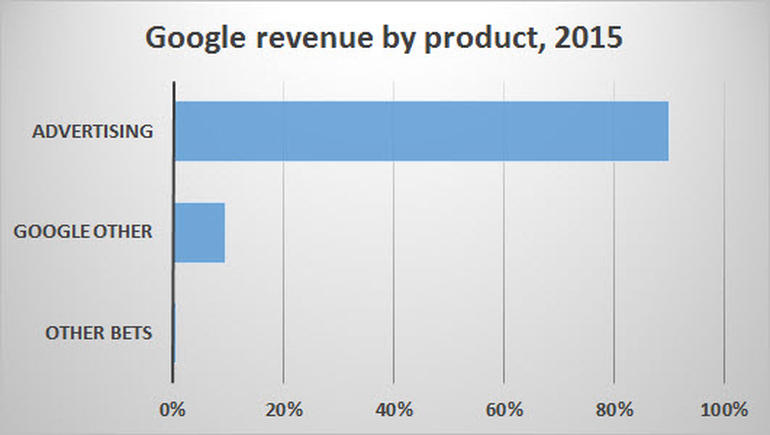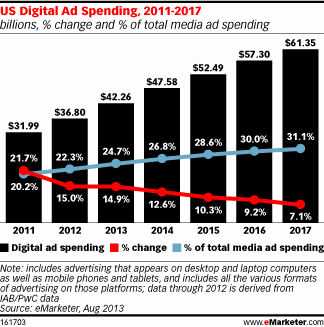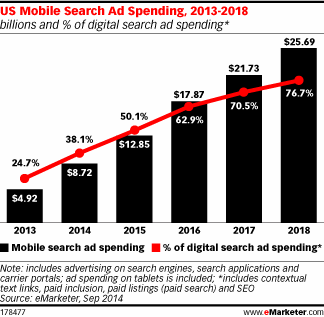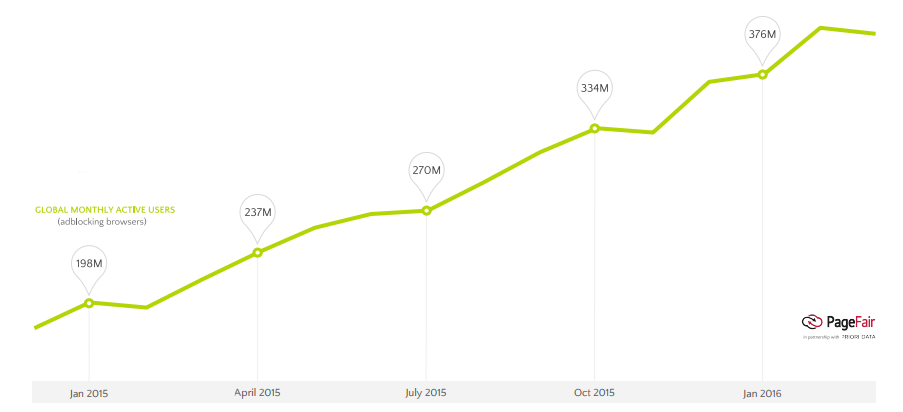Is it beneficial for Apple to be an ally of Google in the fight for the online advertising market?

Does anyone remember that several years earlier, Google was the unreachable leader in the online advertising market? Now in this market, the company has to compete with Facebook.
Google and Facebook are the biggest players in this market. The share of the rest of the companies (Twitter, Yahoo, Pandora) is insignificant, so they cannot yet seriously compete with the leaders.
')
Recently, Facebook is actively seeking to catch up with a competitor. According to estimates by eMarketer, in 2014, Google accounted for 36.9% of the US mobile advertising segment, and 18.5% for Facebook. In a year, their shares were 32.9% and 19.4%, respectively. However, Google will not give up so easily.
Meanwhile, the market itself continues to grow. In 2015, the volume of the American online advertising market increased by 20.4%. According to the PricewaterhouseCoopers and Interactive Advertising Bureau, advertisers began to spend $ 59.6 billion on digital.
35% of their costs were accounted for by mobile advertising, which is 10% more than in 2014.

Analysts at Goldman Sachs say that Google is seeking to grow in the online advertising market through collaboration with Apple. Moreover, the companies made a deal, according to which Google search engine is now pre-installed in Safari browser by default.
In 2015, Google’s revenues from mobile search advertising reached $ 11.8 billion. According to analysts at Goldman Sachs, the company has earned almost $ 9 billion thanks to iPhone and iPad users. Safari provided half of this amount. Owners of iOS-devices enter requests not only in Safari, but also in the Chrome browser, and in iOS-applications of Google.
Google paid Apple $ 1 billion for that deal. Taking Apple into account, Goldman Sachs analysts believe that in order to save this source of income, Google is ready to pay the apple company even more.
How does Apple look at this situation?
Google gives the partner a part of the advertising revenue that is provided by iOS devices.
Based on the information that "leaked" from the courtroom during the hearing of the Oracle-Google dispute, experts concluded that Apple receives about a third.
More than half of Google’s search queries come from mobile devices. The same trend is demonstrated by sites that use Google Analytics. Over 50% of the audience access the Internet from smartphones and tablets. If the information about Apple's “rollback” is correct, then the latter is unlikely to want to end the collaboration. Unless, it can happen for ideological reasons.
It is known that Apple does not approve of many actions of Google. Moreover, Steve Jobs, and later, the entire corporation, had its own position on the subject of privacy, advertising, marketing and relationships with users in principle. The current Apple CEO Tim Cook, in a public report, reiterated this position:
“Our business model is very simple: we sell great products. We do not create a dossier for each user, using his email and information about web surfing, in order to sell them to advertisers. We do not “monetize” information from your iPhone or iCloud. And we do not read your letters and messages in order to use this information for marketing purposes. Our software products and services are designed to make our devices work better. ”

Speaking of what the company is not doing, and is not going to do, Cook had in the form of "tricks" Facebook, Twitter and Google. So, the views of Apple and Google on issues of relations with users differ dramatically. And in the near future the situation is unlikely to change.
In the future, the position of Apple in relation to the advertising industry will become even tougher, suggest TechCrunch experts.
Forecasts
In 2016, the cost of advertisers on mobile SEO and PPC will exceed the costs of desktop search marketing, predicts eMarketer. This indicates that the proportion of Google’s mobile search advertising will depend on Apple even more.

The exact date of expiration of the cooperation agreement between Apple and Google is unknown. According to experts, this will happen this year. Earlier it was reported that Microsoft and Yahoo also claim to be the default search position in Safari.
According to the forecast of Strategy Analytics, by the end of 2022 the number of mobile video audience will increase to 2 billion people.
In an attempt to "conquer the world", advertisers will invest even more in mobile video advertising, trying to reach as many smartphone and tablet users as possible.
Intermediaries in the process of advertising monetization are increasingly Facebook, Twitter, WeChat and other social networks.
Facebook daily generates more than 8 billion views. Representatives of advertising agencies say that at the price of YouTube views (recall that this is a Google service) is cheaper than Facebook in 9 out of 10 cases.
However, sometimes advertisers prefer Facebook because of the presence of a targeted audience. They believe that it will be easier to sell such users services or goods through their channels.
But not everything is as good as advertisers would like to see.

The number of owners of smartphones using ad blocking software has increased by 90% over the last year, according to a recent report by PageFair. In total, advertising on smartphones blocks almost 420 million users worldwide. According to statistics - this is every fifth mobile device on the planet.
Residents of the Asia-Pacific region are actively blocking advertising - blockers are installed on 36% of devices there. In India and Indonesia, adblock applications use two thirds of all smartphone owners. In China, blockers are installed on 159 million devices.
Source: https://habr.com/ru/post/306558/
All Articles